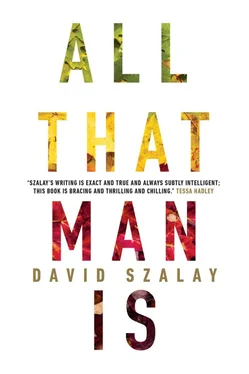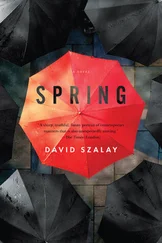Clovis steps forward into the room.
‘To what do we owe the honour?’ André says.
Mathilde asks her brother if he’d like something.
‘No, thank you,’ Clovis says.
Having left the harsh light of the kitchen, she kisses him on the face.
‘I find myself in a difficult position,’ Clovis says.
His sister indicates that he should sit. Again, he declines.
‘I wanted to help,’ he says. ‘I tried to help. But Bérnard has made it clear that he does not want the sort of help that I am able to offer him.’
At the sound of his name, Bérnard, who has been peering into the fridge, looks at his uncle.
‘I’m afraid so,’ Clovis says sadly.
‘What do you mean?’ André asks.
Clovis looks at him and says, ‘I’m sacking your son.’
He half-turns his head in the direction of the kitchen and says, ‘Yes, that’s right, Bérnard — you can go where you like now.’
Bérnard, still illuminated by the open fridge, just stares at his uncle.
Mathilde is already pleading with him.
He is shaking his head. ‘No, no,’ he is saying. ‘No, I’ve made up my mind.’
‘I knew this would happen,’ André murmurs furiously.
‘What?’ Clovis asks him. ‘What did you know?’
Through a friend at the Chambre de Commerce et d’Industrie, he had, a few years ago, found André a job as a Eurostar driver; the interview would have been a formality. André, saying something about the long hours, had turned the opportunity down, and still spends his days trundling back and forth between Lille and Dunkerque, Lille and Amiens. The stopping service. Local routes. Not even the Paris gig.
‘What did you know?’ Clovis asks him, looming over the table where André is sitting with his paper.
André says, clinging to his beer, ‘You didn’t really want to help, did you?’
‘Oh, I did,’ Clovis tells him. ‘I did indeed. Your son is lazy.’ He throws his voice towards the kitchen. ‘Yes, Bérnard. I’m sorry to say it, but you are. You have no ambition. No desire to improve yourself, to move up in the world…’
‘Please, Clovis, please,’ Mathilde is still saying.
He silences her with a lightly placed hand — her shoulder. ‘I’m sorry. I am sorry,’ he says. ‘Despite what your husband says, I did want to help. And I tried. I did what I could. And I will pay him,’ he says, drawing himself up like a monarch in his suede jacket, ‘a month’s wages in lieu of notice.’
‘Clovis…’
‘There is only so much I can do,’ he tells her. ‘What can I do? What do you want me to do?’
‘Give him one more chance.’
‘If I thought it would help him , I would.’
André mutters something.
‘What?’
‘Bollocks,’ André says more distinctly.
‘No. No, André, it is not bollocks ,’ Clovis says, speaking quietly, in a voice trembling with anger. ‘How have I benefited in any way from taking Bérnard on? Tell me how I have benefited.’
There is a tense silence.
Then Clovis, in a sad voice, says, ‘I’m sorry, Bérnard.’
Bérnard, now eating a yoghurt, just nods. He is not as upset as either of his parents seem to be.
He is not actually upset at all. The main facts, as he sees them, are: 1) he does not have to go to work tomorrow, or ever again, and 2) he is getting a thousand euros for nothing.
His mother’s near-tearfulness, his father’s smouldering fury, are just familiar parts of the family scenery.
He is aware that there exists between his father and his uncle some terrible issue, some fundamental unfriendliness — it is not something, however, that he understands. It has always been there. It is just part of life.
Like the way his parents argue.
They are arguing now.
From his room on the top floor of the house he hears them, far below.
When they argue it is either about money — which is always tight — or about Bérnard.
They worry about him, that he understands. They are arguing now out of their worry, shouting at each other.
He does not worry about himself. Their worry, however, sets off a sort of unwelcome humming in his psyche; like the high-pitched pulse of an alarm somewhere far off down the street, leaking anxiety into the night. Their voices now, travelling up through two floors, are like that. They are arguing about him, about what he is going ‘to do with his life’.
To him, the question seems entirely abstract.
He is playing a first-person shooter, listlessly massacring thousands of monstrous enemies.
After an hour or so he tires of it, and decides to visit Baudouin.
—
Baudouin is also playing a first-person shooter, albeit on a much larger and more expensive display — a vast display, flanked by muscular speakers. His father, also Baudouin, is a dentist, and the younger Baudouin is himself studying dentistry at the university. He is the only university friend with whom Bérnard is still in touch.
In keeping with his impeccably provisioned life, Baudouin always has a substantial stash of super-skunk — imported from Holland, and oozing crystals of THC — and Bérnard skins up while his friend finishes the level.
He says, ‘I’ve been sacked.’
Baudouin, the future dentist, takes out half a dozen zombies. ‘I thought you worked for your uncle,’ he says.
‘Yeah. He sacked me.’
‘What a twat.’
‘He is a twat.’
Baudouin stretches out a white hand for the spliff.
Bérnard obliges him. ‘I don’t give a shit,’ he says, as if worried that his friend might think he did.
Baudouin, blasting, grunts.
‘I get a month’s pay. Severance or whatever.’ Bérnard says that with some pride.
Baudouin, however, seems unimpressed: ‘Yeah?’
‘And now I can come to Cyprus for sure.’
Passing him the spliff again, and without looking at him, Baudouin says, ‘Oh, I need to talk to you about that.’
‘What?’
‘I can’t go.’
‘What d’you mean?’
‘I didn’t pass Biochemistry Two,’ Baudouin says. ‘I need to take it again.’
‘When’s the exam?’ Bérnard asks.
‘In two weeks.’
‘So why can’t you go?’
‘My dad won’t let me.’
‘Fuck that.’
Baudouin laughs, as if in agreement. Then he says, ‘No, he says it’s important I don’t fail again.’
Bérnard, sitting somewhat behind him on one of the tatami mats that litter the floor, has a pull on the spliff. He feels deeply let down. ‘You seriously not coming then?’ he asks, unable to help sounding hurt.
What makes it worse, the whole thing was Baudouin’s idea.
It had been he who found, somewhere online, the shockingly inexpensive package that included flights from Charleroi airport and seven nights at the Hotel Poseidon in Protaras. It had been he who persuaded Bérnard — admittedly, he needed little persuading — that Protaras was a hedonistic paradise, that the weather in Cyprus would be well hot enough in mid-May, and that it was an excellent time for a holiday. He had stoked up Bérnard’s enthusiasm for the idea until it was the only thing on which he fixed his mind as he tried to survive the interminable afternoons on the greyish-brown industrial estate.
And now he says, still mostly focused on the screen in front of him, ‘No. Seriously. I can’t.’
His hand, stretched out, is waiting for the spliff.
Bérnard passes it to him, silently.
‘What am I supposed to do?’ he asks after a while.
‘Go!’ Baudouin says, over the manic whamming of the speakers. ‘Obviously, go. Why wouldn’t you? I would.’
‘On my own?’
‘Why wouldn’t you?’
‘Only saddoes,’ Bérnard says, ‘go on holiday on their own.’
Читать дальше












